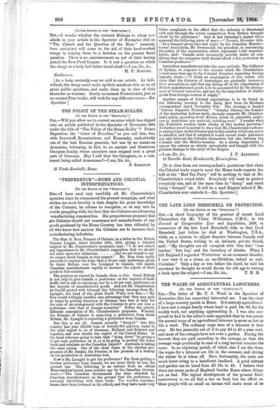"PREFERENCE."—HOME AND COLONIAL INTERPRETATIONS.
pro THE EDITOR OF THE "SPECTATOE."J
Sire,—I have read very carefully all Mr. Chamberlain's speeches since he commenced his present campaign, and what strikes me most forcibly is that, despite his great knowledge of the Colonies, he refuses to recognise, or at any rate he avoids grappling with, the fact that the Colonies are advancing nanufa,cturing communities. His preposterous proposal that ihe Colonies should not commence new manufactures of any goods produced by the Home Country has been ridiculed by all who know how anxious the Colonies are to increase their manufacturing industries.
The Hon. G. Ross, Premier of Ontario, in a letter to the British Empire League, dated October 20th, 1903, giving a deluded support to Mr. Chamberlain's proposals, says : "I do not attach any importance to Mr. Chamberlain's suggestion that we should
not enter upon new industries and we are bound to say we cannot check Canada in this respect " Mr. Ross then coolly proceeds to express the hope that a 10 per cent. preference, given by Great Britain over the foreigner to Canada, will enable Canadian manufacturers rapidly to increase the export of their goods to this country.
The position as viewed by Canada, then, is this. Great Britain is not only to give Canada a preference on her imports of food- stuffs, but is also to encourage her by a 10 per cent, preference on her imports of manufactured goods. And yet Mr. Chamberlain at Cardiff quoted with triumph the following message from Mr. Lysaght, the head of the great South Wales iron firm :—" My firm would willingly 'sacrifice any advantage that they may gain at times by getting American or German bars free of duty for the sake of an arrangement with the Colonies to give our iron a preference over that of foreign countries." Notice the utterly different conception of Mr. Chamberlain's proposals. Whereas the Premier of Ontario is expecting a preference from Great Britain, Mr. Lysaght is expecting a preference from Canada.
But this is not all. Canada actually " dumped " into this country last year 103,000 tons of bounty-fed pig-iron, equal to the total export to us of Germany, Holland, and Belgium put together, and over double the export of the United States. Is the fiscal reformer going to take that "lying down" by giving a 10 per cent. preference on it, or is he going to protect the home trade and retaliate on the Canadian import ? Australia is taking the same course. One of the chief itezzis in the election pro- gramme of Mr. Deakin, the Premier, is the promise of a bounty on the production of Australian iron.
How. is Mr. Lysaght to get his preference ? Far from getting a further preference from Canada, we are more likely to lose the present one. The following -is an extract from an offiCial Memorandum! issued some months ago by the Canadian Govern- ment :—" The Canadian Government has been , attacked by Canadian manufacturers on the ground that the preference is seriously interfering with their trade. The woollen manufac- turers have been foremost in the attack, and they have made very bitter complaints to the effect that the industry is threatened with ruin through the severe competition from Britain brought about by the preference." And in last Saturday's papers there appeared the following piece of news:—" Toronto November 20th. —At a banquet given here last night by the Canadian Manufac- turers' Association, Mr. Drummond, the president, in announcing the policy of the organisation, which represents 1,600 manufac- turers, said: 'Canada must necessarily provide under all con- ditions that the minimum tariff should afford a fair protection to Canadian producers.' " Australian manufacturers take the same attitude. The Collector at Sydney, in response to the circular which Mr. Chamberlain issued some time ago to the Colonial Premiers regarding foreign imports, wrote:—" I think an examination of this return wip show that the Colonies of Australasia are gradually increasing their manufactures, and that any falling off in the importation of British manufactured goods is to be accounted for by the develop- ment of Colonial industries, and not by the importation of similar goods from foreign sources of supply.'
Another sample of Colonial expectations is to be found in the following message to the Daily Mail from its Brisbane correspondent dated November 17th. The message is headed "Labour Supports Protection." "Senator Glassey, the founder of the Australian Labour party, strongly supports Mr. Chamber- lain's policy, providing Great Britain grants an adjustable prefer- ence to Australian raw material, including wool." I wonder what the Yorkshire woollen trade thinks of this modest provision ? No further proof is needed to show that Mr. Chamberlain's schema is raising hopes in the Colonies and in this country which can never be satisfied, and that if adopted it would arouse trade jealousies not only between the Colonies themselves but also between the Colonies and the Mother-country. As a strong Imperialist, I oppose the scheme as utterly unworkable and fraught with tho greatest damage to the unity of the Empire.
10 Turville Road, Handsworth, Birmingham.
[It is clear from our correspondent's quotations that when the Colonial trade experts meet the Home trade experts the talk at the "Mad Tea Party" will be nothing to that at Mr. Chamberlain's round table. Everybody will want to protect everybody else, and at the same time to "dump" and resist being "dumped" on. It will be a mad Empire indeed if Mr.
Chamberlain ever controls it.—ED. Spectator.]


















































 Previous page
Previous page